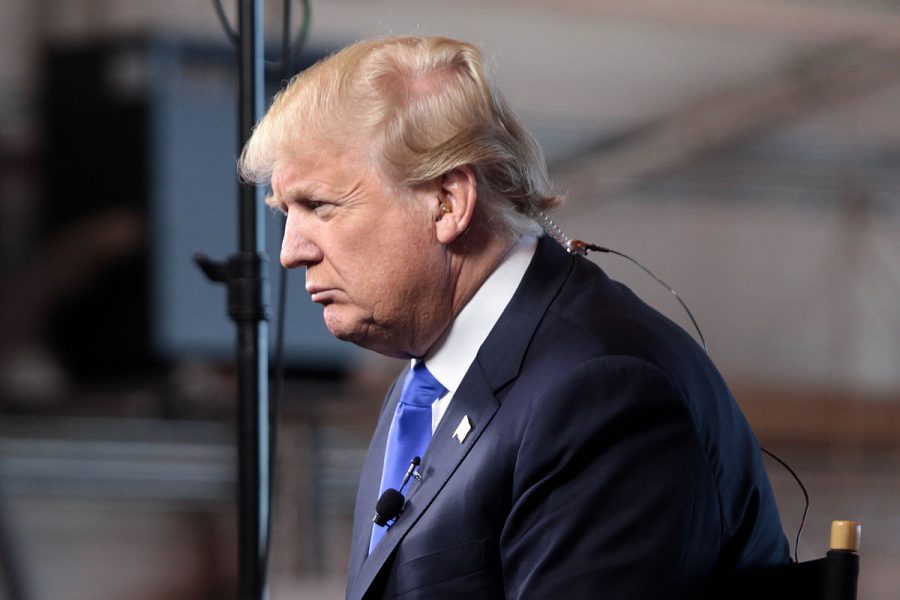Trump’s transgender military ban leaves room for discussion
August 2, 2017
On Wednesday, President Donald Trump announced on Twitter that transgenders will no longer be allowed to serve in the US armed forces. This decision could possibly reverse former President Barack Obama’s repeal of the, “Don’t Ask, Don’t Tell,” policy which allowed gay men and lesbians to serve openly in the military.
President Trump issued this three-part series of tweets to declare that the military cannot afford the medical expenses that transgenders need.
“After consulting with my Generals and military experts, please be advised that the United States government will not accept or allow transgender individuals to serve in any capacity in the US military,” Trump said. “Our military must be focused on decisive and overwhelming victory and cannot be burdened with the tremendous medical costs and disruption that transgenders in the military would entail.”
Although transgenders receive money from the military for medical procedures, a 2016 Rand Study determined that allowing transgenders to serve openly would have a “minimal impact” on the military. This is because only 1,300 to 6,600 active service members are openly transgender- a small percentage compared to the current 1.3 million active member-force. The study also pointed out that transgender medical costs range between $2.4 to $8.4 million which is another small proportion of the Pentagon’s $49.3 billion funds.
“This is a military decision,” White House Press Secretary Sarah Huckabee Sanders said. “It’s not supposed to be any more than that.”
What started out as a simple fund cut has resulted in a nationwide cry of outrage. People in the LGBTQ community and its supporters feel that Trump’s Transgender Ban is an act of discrimination and will set the country back regarding social equality.
“We believe that any such change in policy would be absolutely unconstitutional and it violates fundamental notions of fairness in the military,” Jon Davidson, legal director of the LGBT rights group Lambda Legal, said. “Transgender people have been serving openly for a year and there have been no disruptions. This disproves the notion that there’s some threat to military readiness and unit cohesion.”
The transgender ban not only has an effect on LGBT members serving in the military but anyone who believes homosexual acceptance is a key part of our country’s progression.
“The job of our president is to move our country forward but we are only putting ourselves at a halt by continuously leaving large communities out,” senior Damien Hamilton said. “We are all Americans. Someone’s preference shouldn’t determine if they are allowed to serve in the military.”
However, many are confused as to what Trump’s agenda truly is, claiming that better avenues of explanation could’ve been taken.
“The fact of the matter is that President Trump took the easy way out of a complex issue. Last June, former Obama defense secretary Ashton Carter began the process to allow transgender individuals to serve in the military by not reinstating an already existing ban. It has been one year then, and now roughly 6,000 transgender individuals serve,” senior Landon Ryden said. “By now, our military knows if any issues relating to transgender individuals can or even will occur, and I believe that if there are no issues, by all means let them serve our country. However, I also believe it should not be the government’s responsibility to perform sex change procedures or hormonal therapies for these individuals, due to the financial discrimination this would put on other personnel or veterans currently on the waiting list for medical aid.”
Whether or not this announcement was an act of prejudice, or simple logic, there remains numerous concerns regarding the medical and psychological aspects of allowing transgenders to serve.
“I will clearly say yes, it’s an act of discrimination but there are many other variables to consider when selecting people for our military. After any surgery there are always risk of infection along with recovery time and life long expenses. Others voice the lack of knowledge of the psychology of transgender people and how this variable could lead to issues between transgenders and other military personnel,” senior Jake Weems said. “I don’t think it will affect the military, it will have and does have bigger effects on society, people’s views on Trump and the ‘fight’ of transgender and LGBTQ rights.”
According to Defense Secretary James Mattis, the transgender ban will not go into effect yet since there is no plan designed to implement the policy.




















